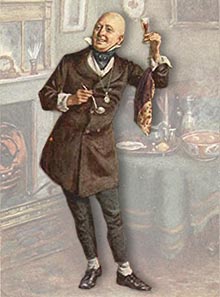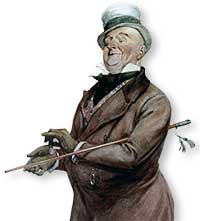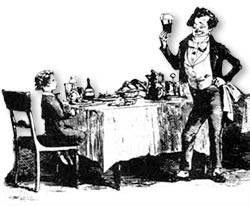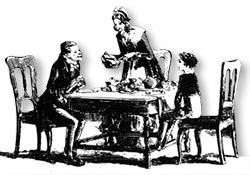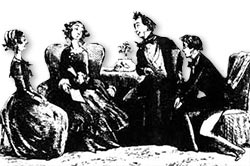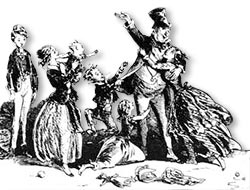Charles Dickens'
David Copperfield
The Personal History and Experience of David Copperfield the Younger
David Copperfield - Published in monthly parts May 1849 - Nov 1850
Charles Dickens' eighth novel, illustrated by Phiz, is a thinly disguised autobiography with many of the story lines mirroring Dickens' own life. Dickens' friend and first biographer, John Forster, wrote that "Dickens never stood so high in reputation as at the completion of Copperfield", and that in the novel Dickens had cast the suspicion "that underneath the fiction lay something of the author's life" (Forster, 1899, v. 2, p. 120).In telling the story of the child David, Dickens displays the unique ability to make the reader see through the eyes of the child, capturing the very essence of childhood.
In his biography of Dickens, Edgar Johnson notes that "Few novelists have ever captured more poignantly the feeling of childhood, the brightness and magic and terror of the world as seen through the eyes of a child and colored by his dawning emotions" (Johnson, 1952, p. 677).
Norrie Epstein, in The Friendly Dickens, notes that by writing about his parents and reliving his childhood, Dickens triumphed over his past and would never again need to make a neglected child the central focus of a novel (Epstein, 1998, p. 229).
In the 1867 preface to the Charles Dickens Edition of David Copperfield Dickens, describing the books he had written as his children, said "...like many fond parents, I have in my heart of hearts a favourite child. And his name is David Copperfield."
Plot
(contains spoilers)David is born at Blunderstone in Suffolk, his father having died six months earlier. David's widowed mother draws the attention of Edward Murdstone, whom David dislikes. David goes to Yarmouth for two weeks with Peggotty, his mother's housekeeper, where he meets Mr Peggotty, Emily, Ham, and Mrs Gummidge. On his return home he finds that his mother has married Mr Murdstone, whose sister, Jane, moves into the household.
David, under the oppression of the Murdstones, falls behind in his studies and is given a beating during which he bites Mr Murdstone.
He is sent away to school at Salem House Academy near London run by the cruel Mr Creakle. Upon arrival at the school he is forced to wear a sign saying: Be careful of him, he bites. David befriends Steerforth and Traddles.David learns that his mother and his baby step-brother, son of Mr Murdstone, have died and is removed from school. Peggotty marries Barkis and visits David regularly. Murdstone sends David to London to work in the Murdstone and Grinby warehouse. He takes lodging with the Micawbers. The insolvent Micawbers are continually being harassed by creditors until, finally, Mr Micawber is imprisoned for debt in the King's Bench Prison. After Micawber's release from debtor's prison, the family escapes to the country hoping that "something will turn up." David is miserable at Murdstone and Grinby's and decides to run away to Dover to throw himself on the mercy of his aunt, Betsey Trotwood.
David's aunt adopts him after contacting the Murdstones and verifying their treatment of him. David befriends Mr Dick, who lives with his aunt. Betsey sends David to Dr Strong's school in Canterbury where he lodges with Betsey's lawyer, Mr Wickfield, and his daughter Agnes. He meets Uriah Heep.
David meets the Micawbers again in Canterbury, where they have come to look for work, and introduces Mr Micawber to Uriah Heep. David finishes school and, trying to decide what to do with his life, journeys back to Yarmouth to visit Peggotty. He stops in London on the way and runs into Steerforth who joins him on the trip to Yarmouth. They visit Peggotty and Mr Peggotty who announces that Ham and Emily are to be married.David decides to become a proctor in Doctor's Commons and is apprenticed to Spenlow and Jorkins. He takes lodging with Mrs Crupp in the Adelphi section of London. Agnes warns David against Steerforth and tells him that that Uriah Heep has weasled his way into a partnership with her father, capitalizing on Mr Wickfield's weaknesses. David falls in love with Spenlow's daughter Dora and finds that his old guardian, Jane Murdstone, is Dora's "confidential friend."
David runs into his old friend Traddles and visits him in Camdentown where he learns that Traddles is a boarder with the Micawbers, who are still trying to keep a step ahead of creditors.
Barkis is dying and David journeys to Yarmouth to be with Peggotty during this crisis. Steerforth secretly charms Emily away from Ham and they run away together, Mr Peggotty goes in search of her. Betsey Trotwood visits David in London and informs him that she has lost her fortune through bad business deals, she and Mr Dick move in with David. David goes to work for Dr. Strong, learning shorthand to try to earn money while still apprenticed at Doctor's Commons.
David and Dora are engaged in secret. Miss Murdstone finds David's letters to Dora and she and Mr Spenlow confront David, telling him to forget about Dora. Mr Spenlow is then found dead, with no will, and Dora goes to live with two spinster aunts, Clarissa and Lavinia.Mr Micawber is employed by Uriah Heep who has moved in with the Wickfields and has designs on Agnes, much to Mr Wickfield's agony. David, like Dickens, becomes a parliamentary reporter and begins to write and have his stories published. His success allows him to marry Dora.
David has his first book published and becomes a successful author. Dora has no grasp of housekeeping despite David's coaxing. She begins to deteriorate with an unspecified illness. With the help of Martha, Emily is found, and plans are made for her to emigrate with Mr Peggotty to Australia.
Mr Micawber is entangled in the designs of Uriah Heep and becomes estranged from his family. Finally he comes forward and with the help of Traddles, exposes Heep as a cheat and a fraud, responsible for the decline of Mr Wickfield and Betsey Trotwood's reverse of fortune.Dora, on her deathbed, secretly asks Agnes to care for David. Betsey, her fortune restored, loans the Micawbers money to emigrate to Australia with Mr Peggotty and Emily. David travels to Yarmouth to deliver a message to Ham and witnesses a storm at sea in which Steerforth drowns and Ham dies trying to rescue him. Peggotty and Emily emigrate with the Micawbers unaware of the death of Ham.
David travels abroad for three years during which he finds that he has really loved Agnes all along. On his return to England he marries Agnes. Mr Peggotty and Emily prosper in Australia. Mr Micawber becomes a Magistrate in Port Middlebay. David and Agnes raise a family and David writes his autobiography.
Complete List of Characters:
Character descriptions contain spoilersDavid Copperfield Links:
Bartleby.comSparkNotes - Excellent!
Wikipedia
David Copperfield - locations outside London
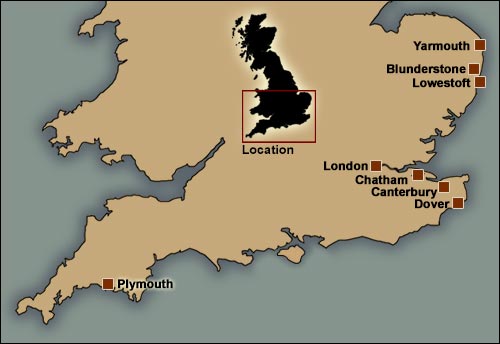
Blunderstone - David's birthplace.
Canterbury - David attends Dr. Strong's school here, also the home of the Wickfields and the Heeps.
Chatham - On the way to see Aunt Betsey David passes through the town where Dickens lived as a child.
Dover - Home to David's aunt Betsey.
Lowestoft - David visits here with Mr Murdstone.
Plymouth - The Micawbers travel here hoping something will turn up for Mr Micawber in the Custom House.
Yarmouth - Seaside town, home to the Peggottys.
Australia
During the writing of David Copperfield Charles Dickens was actively involved in the day-to-day operation of Urania Cottage, a home for homeless women, which he administered on behalf of his friend, philanthropist Angela Burdett Coutts. The home helped to separate homeless, and "fallen", women from previous lifestyles, educate them in the execution of household duties and self-discipline, and then help them emigrate to Australia to begin new lives.In David Copperfield, Dickens has several of the major characters emigrate to Australia: the Micawbers, Mr Peggotty, Emily, Martha, and Mr Mell. Each of these characters are successful in beginning a new life in the English colony.
Preface to the Charles Dickens Edition of David Copperfield
I remarked in the original Preface to this Book, that I did not find it easy to get sufficiently far away from it, in the first sensations of having finished it, to refer to it with the composure which this formal heading would seem to require. My interest in it was so recent and strong, and my mind was so divided between pleasure and regret-pleasure in the achievement of a long design, regret in the separation from many companions-that I was in danger of wearying the reader with personal confidences and private emotions. Besides which, all that I could have said of the Story to any purpose, I had endeavoured to say in it. It would concern the reader little, perhaps, to know how sorrowfully the pen is laid down at the close of a two-years' imaginative task; or how an Author feels as if he were dismissing some portion of himself into the shadowy world, when a crowd of the creatures of his brain are going from him for ever. Yet, I had nothing else to tell; unless, indeed, I were to confess (which might be of less moment still), that no one can ever believe this Narrative, in the reading, more than I believed it in the writing. So true are these avowals at the present day, that I can now only take the reader into one confidence more. Of all my books, I like this the best. It will be easily believed that I am a fond parent to every child of my fancy, and that no one can ever love that family as dearly as I love them. But, like many fond parents, I have in my heart of hearts a favourite child. And his name is DAVID COPPERFIELD.
--Charles Dickens 1867
- Sketches by Boz |
- Pickwick |
- Oliver Twist |
- Nickleby |
- Old Curiosity Shop |
- Barnaby Rudge |
- Chuzzlewit |
- Christmas Carol |
- Christmas Books |
- American Notes |
- Pictures from Italy |
- Dombey and Son |
- Copperfield |
- Bleak House |
- Hard Times |
- Little Dorrit |
- Tale of Two Cities |
- Great Expectations |
- Our Mutual Friend |
- Edwin Drood |
- Minor Works |
- The Uncommercial Traveller |
- Short Stories


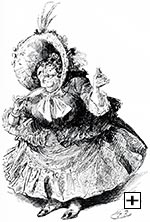
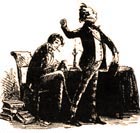


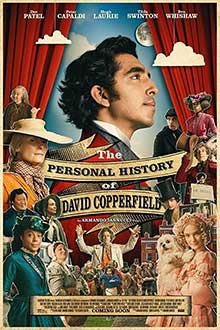

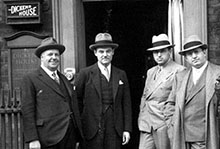
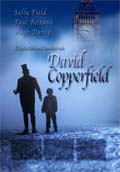


 David Copperfield, like Charles Dickens himself, had a small cache of books that accompanied him in his lonely childhood and helped form his character.
David Copperfield, like Charles Dickens himself, had a small cache of books that accompanied him in his lonely childhood and helped form his character.